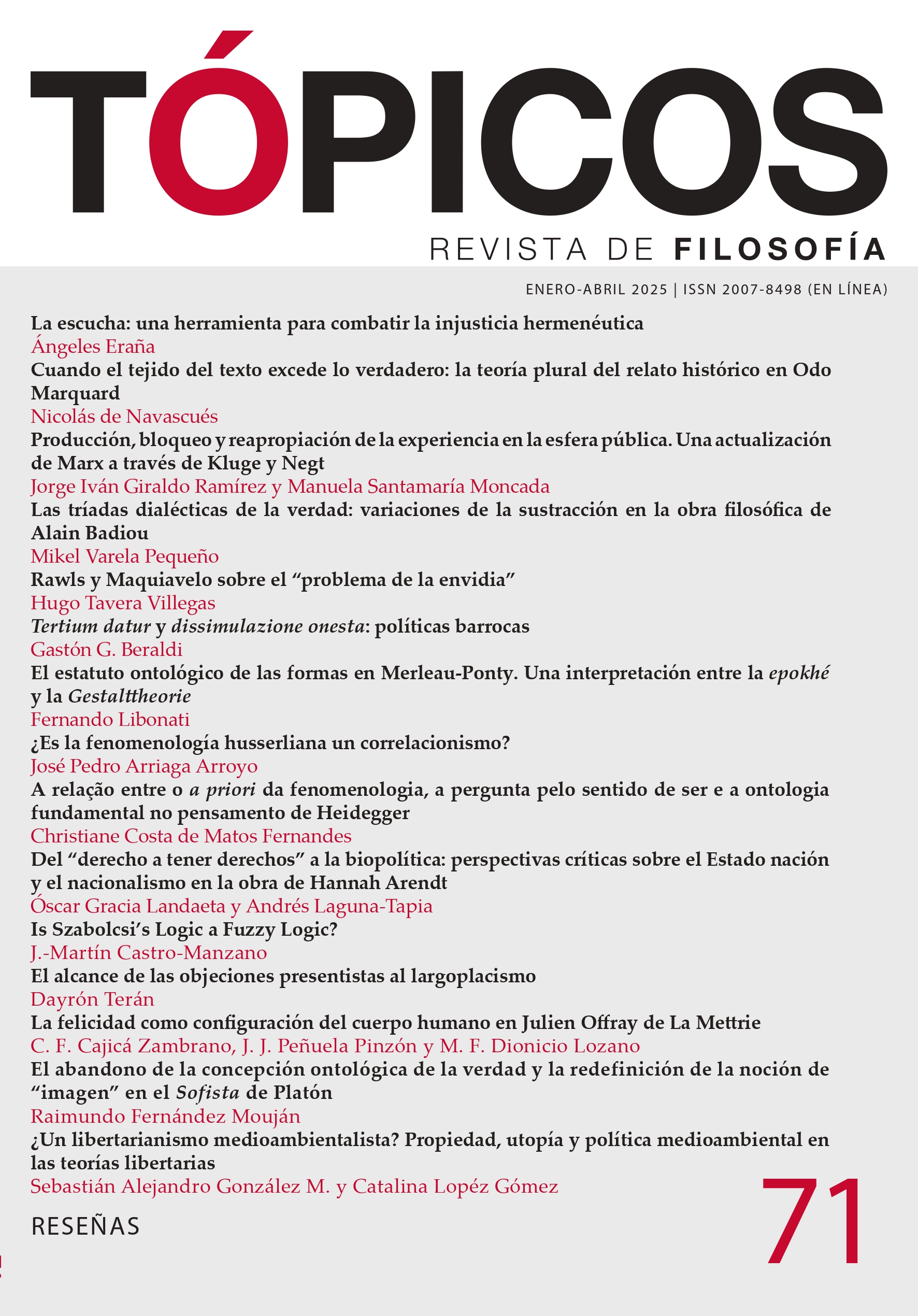From the “Right to Have Rights” to Biopolitics: Critical Perspectives on the Nation-State and Nationalism in the Work of Hannah Arendt
Published 2024-12-16
How to Cite
Copyright (c) 2024 Tópicos, Revista de Filosofía

This work is licensed under a Creative Commons Attribution-NonCommercial-NoDerivatives 4.0 International License.
Downloads
Altmetrics
Citas
Abstract
This paper explores the connections between The Origins of Totalitarianism and The Human Condition regarding the concepts of nation, nation state and nationalism. In doing so, it expands on Hannah Arendt’s best-known ideas on these topics from perspectives specific to her reflection on the vita activa. To this end, both the reconstruction of Arendt’s critical stance towards capitalism and the concept of biopolitics (not explicitly mentioned by Arendt in her work) allow us to reread The Human Condition from a perspective centered on Arendt’s thematization of “the national”. Such an analysis aims not only at broadening the possibilities of Arendt’s reflection on the nation and nationalism, but also at renewing the philosophical ideas on these contemporary phenomena.
References
- Agamben, G. (2006). Homo Saccer. El poder soberano y la nuda vida I. A. Gimeno Cuspinera (trad.).Pre-Textos.
- Arendt, H. (1962). The Origins of Totalitarianism. Meridian Books.
- Arendt, H. (1998). The Human Condition. University of Chicago Press.
- Arendt, H. (2000). The Portable Hannah Arendt. Penguin Books.
- Arendt, H. (2001). El concepto de amor en san Agustín. A. Serrano de Haro (trad.). Encuentro Ediciones.
- Arendt, H. (2005). Ensayos de comprensión. 1930-1954. Escritos no reunidos e inéditos de Hannah Arendt. A. Serrano de Haro (trad.). Caparrós Editores.
- Arendt, H. (2007). The Jewish Writings. Schocken Books.
- Arendt, H. (2010). Estado nacional y democracia (1963). J. A. Zamora (trad.). Arbor. Ciencia, Pensamiento, Cultura. 186(742), 191-194. URL: https://arbor.revistas.csic.es/index.php/arbor/article/view/770.
- Bazzicalupo, L. (2010). Biopolítica. Un mapa conceptual. Editorial Melusina.
- Beiner, R. (2000). Arendt and Nationalism. En D. Villa (ed.), The Cambridge Companion to Hanna Arendt. (pp. 44-62). Cambridge University Press.
- Benhabib, S. (2003). The Reluctant Modernism of Hannah Arendt. Rowman and Littlefield Publishers.
- Benhabib, S. (2004). The Rights of Others: Aliens, Residents and Citizens. Cambridge University Press.
- Birmingham, P. (2006). Hannah Arendt and Human Rights: The Predicament of Common Responsibility. Indiana University Press.
- Birulés, F. (2007). Una herencia sin testamento: Hannah Arendt. Herder.
- Blencowe, C. (2010). Foucault’s and Arendt’s ‘Insider View’ of Biopolitics: A Critique of Agamben. History of the Human Sciences, 23(5), 113-130. DOI: https://doi.org/10.1177/0952695110375762.
- Braun, K. (2007). Biopolitics and Temporality in Arendt and Foucault. Time & Society, 16(1), 5-23.
- Canovan, M. (1992). Hannah Arendt: A Reinterpretation of her Political Thought. Cambridge University Press.
- Delos, J.-T. (1944). Le problème de civilisation. La nation. Éditions de l’Arbre.
- Di Pego, A. (2010). Biopolítica y totalitarismo en Hannah Arendt. En M. de la P. Echeverría y P. Vestfrid (eds.), Tridecaedro. Jóvenes investigadores en ciencias sociales de la UNLP. (pp. 62-74). EDULP. URL: http://sedici.unlp.edu.ar/handle/10915/90835.
- Di Pego, A. (2015). La modernidad en cuestión. Totalitarismo y sociedad de masas en Hannah Arendt. Editorial de la Universidad Nacional de La Plata.
- Duarte, A. (2004). Biopolítica y diseminación de la violencia. Hannah Arendt y la crítica del presente. Pasajes: Revista de Pensamiento Contemporáneo, 13, 97-105. URL: http://hdl.handle.net/10550/46104.
- Feldman, R. (2007). Introduction. The Jew as Pariah: The Case of Hannah Arendt. (1906-1975). En H. Arendt, The Jewish Writings. (pp. xli-lxxvi). Schocken.
- Forti, S. (2001). Vida del espíritu y tiempo de la polis. Hannah Arendt entre filosofía y política. Ediciones Cátedra.
- Gracia Landaeta, Ó. (2021). Nación, Modernidad y sociedad de masas: una relectura del nacionalismo contemporáneo a partir de Arendt. [Tesis doctoral, Pontificia Universidad Católica de Chile]. Repositorio de la Pontificia Universidad Católica de Chile. DOI: https://doi.org/10.7764/tesisUC/FIL/63671.
- Jerade Dana, M. (2015). Nacionalismo y antisemitismo. Hannah Arendt sobre la cuestión judía y el Estado nación. Revista Mexicana de Ciencias Políticas y Sociales, 15(225), 341-368. URL: https://www.elsevier.es/es-revista-revista-mexicana-ciencias-politicas-sociales-92-articulo-nacionalismo-antisemitismo-hannah-arendt-sobre-S0185191815300295.
- Kohn, H. (1946). The Idea of Nationalism: A Study in Its Origins and Background. Macmillan.
- Kohn, J. (2005). Introduction. En H. Arendt, Essays in Understanding. 1930-1954. (pp. ix-xxxi). Shocken.
- Mantena, K. (2010). Genealogies of Catastrophe: Arendt on the Logic and Legacy of Imperialism. En S. Benhabib (ed.), Politics in Dark Times: Encounters with Hannah Arendt. (pp. 83-112). Cambridge University Press.
- Parekh, B. (1981). Hannah Arendt and the Search for a New Political Philosophy. Macmillan.
- Parekh, S. (2008). Hannah Arendt and the Challenge of Modernity: A Phenomenology of Human Rights. Routledge.
- Prinz, A. (2001). La filosofía como profesión o amor al mundo. La vida de Hannah Arendt. M. Ibarra de Diego (trad.). Herder.
- Ricoeur, P. (1991). Préface à Condition de l’homme modern. (1983). En P. Ricoeur, Lectures. 1. Autour du politique. Éditions du Seuil.
- Sánchez Madrid, N. (2013). Crisis del Estado-nación y dialéctica de los derechos humanos en Hannah Arendt. El totalitarismo como colapso de las formas políticas. Isegoría, 49, 481- 507. DOI: https://doi.org/10.3989/isegoria.2013.049.07.
- Sánchez Muñoz, C. (2007). Hannah Arendt: los caminos de la pluralidad. Intersticios, 10(22-23), 221-237.






